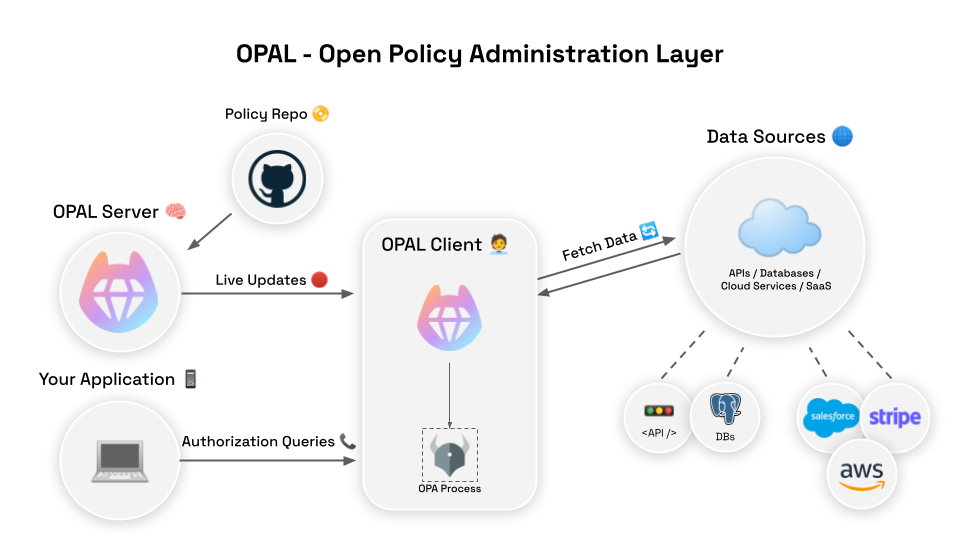
⚡OPAL⚡
Open Policy Administration Layer







What is OPAL?
OPAL is an administration layer for Policy Engines such as Open Policy Agent (OPA), and AWS' Cedar Agent detecting changes to both policy and policy data in realtime and pushing live updates to your agents. OPAL brings open-policy up to the speed needed by live applications.
As your app's data state changes (whether it's via your APIs, DBs, git, S3 or 3rd-party SaaS services), OPAL will make sure your services are always in sync with the authorization data and policy they need (and only those they need).
Check out OPAL's main site at OPAL.ac
OPAL Use Cases
OPAL is the easiest way to keep your solution's authorization layer up-to-date in realtime. It aggregates policy and data from across the field and integrates them seamlessly into the authorization layer, and is microservices and cloud-native.
Here are some of the main use cases for using OPAL:

OPAL uses a client-server stateless architecture. OPAL-Servers publish policy and data updates over a lightweight (websocket) PubSub Channel, which OPAL-clients subscribe to via topics. Upon updates, each client fetches data directly (from the source) to load it into its managed Policy Engine instance.
OPA + OPAL == 💜
While OPA (Open Policy Agent) decouples policy from code in a highly-performant and elegant way, the challenge of keeping policy agents up-to-date remains.
This is especially true in applications, where each user interaction or API call may affect access-control decisions.
OPAL runs in the background, supercharging policy agents and keeping them in sync with events in real time.
AWS Cedar + OPAL == 💪
Cedar is a very powerful policy language, which powers AWS' AVP (Amazon Verified Permissions) - but what if you want to enjoy the power of Cedar on another cloud, locally, or on premise?
This is where Cedar-Agent and OPAL come in.
This video briefly explains OPAL and how it works with OPA, and a deeper dive into it at this OWASP DevSlop talk.
Who's Using OPAL?
OPAL is being used as the core engine of Permit.io Authorization Service and serves in production:
- > 10,000 policy engines deployment
- > 100,000 policy changes and data synchronizations every day
- > 10,000,000 authorization checks every day
Besides Permit, OPAL is being used in Production in Tesla, Walmart, The NBA, Intel, Cisco, Live-Oak Bank, and thousands of other development teams and companies of all sizes.
Documentation
-
📃 Full documentation is available here
-
💡 Intro to OPAL
-
🚀 Getting Started:
OPAL is available both as python packages with a built-in CLI as well as pre-built docker images ready-to-go.
-
A video demo of OPAL is available here
-
You can also check out this webinar and Q&A about OPAL on our YouTube channel
-
💪 TL;DR - This one command will download and run a working configuration of OPAL server and OPAL client on your machine:
curl -L https://raw.githubusercontent.com/permitio/opal/master/docker/docker-compose-example.yml \
> docker-compose.yml && docker compose up

📖 For further reading, check out our Blog
We would love to chat with you about OPAL. Join our Slack community to chat about authorization, open-source, realtime communication, tech, or anything else!
You can raise questions and ask for features to be added to the road-map in our Github discussions, report issues in Github issues
If you like our project, please consider giving us a ⭐️


Contributing to OPAL
- Pull requests are welcome! (please make sure to include passing tests and docs)
- Prior to submitting a PR - open an issue on GitHub, or make sure your PR addresses an existing issue well.
There's more!
- Check out OPToggles, which enables you to create user targeted feature flags/toggles based on Open Policy managed authorization rules!
- Check out Cedar-Agent, the easiest way to deploy & run AWS Cedar.











